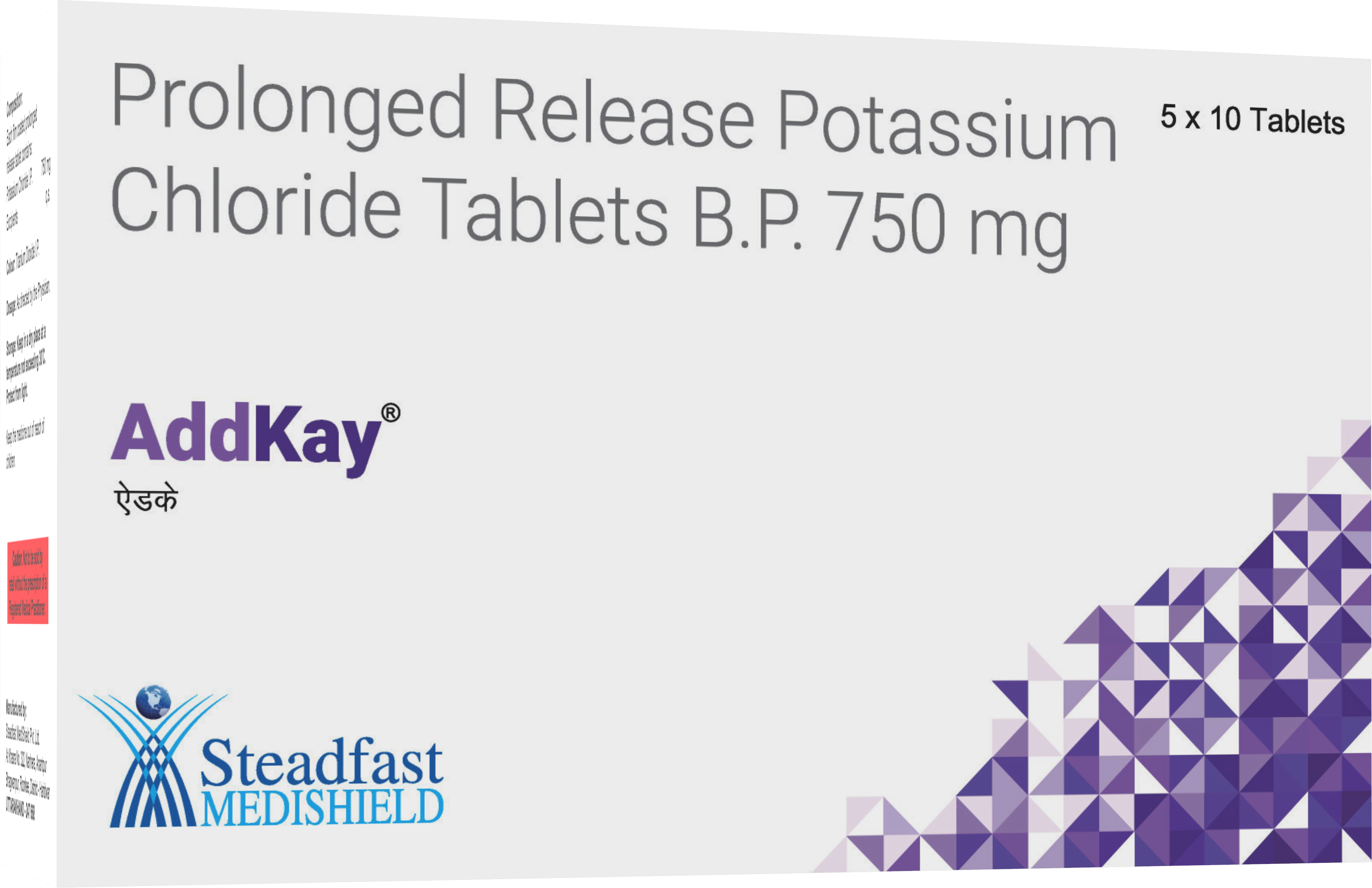Description
AddKay is a solid oral dosage form of potassium chloride and is an electrolyte replenisher. Its structural formula is KCl.
This formulation is intended to provide prolonged-release of potassium, minimise the likelihood of producing high, localised concentrations of potassium within the gastrointestinal tract. Each 750 mg of prolonged release Potassium Chloride tablet provides 10 mEq of potassium.
Composition
Each Prolonged Release Tablet Contains Potassium Chloride I.P. 750 mg
Pharmacology
The potassium ion is the principal intracellular cation of most body tissues. Potassium ions participate in a number of essential physiological processes including the maintenance of intracellular tonicity, the transmission of nerve impulses, the contraction of cardiac, skeletal and smooth muscle and the maintenance of normal renal function.
The normal adult plasma concentration is 3.5 to 5 mEq per litre. An active ion transport system maintains this gradient across the plasma membrane.
The usual dietary intake of potassium is 50 to 100 mEq per day. Potassium depletion will occur whenever the rate of potassium loss through renal excretion and/or loss from the gastrointestinal tract exceeds the rate of potassium intake. Such depletion usually develops slowly as a consequence of prolonged therapy with oral diuretics, primary or secondary hyperaldosteronism, diabetic ketoacidosis, severe diarrhoea, or inadequate replacement of potassium in patients on prolonged parenteral nutrition. Potassium depletion due to these causes is usually accompanied by a concomitant loss of chloride and is manifested by hypokalemia and metabolic alkalosis.
Potassium depletion may produce weakness, fatigue, disturbances of cardiac rhythm (primarily ectopic beats), prominent U-waves in the electrocardiogram and, in advanced cases, flaccid paralysis and/or impaired ability to concentrate urine.
If potassium depletion associated with metabolic alkalosis cannot be managed by correcting the fundamental cause of the deficiency, e.g., where the patient requires long term diuretic therapy, supplemental potassium in the form of high potassium food or potassium chloride may be able to restore normal potassium levels.
Indications and Usage
1. For the therapeutic use of patients with hypokalemia, with or without metabolic alkalosis; in digitalis intoxication; and in patients with hypokalemic familial periodic paralysis. If hypokalemia is the result of diuretic therapy, consideration should be given to the use of a lower dose of diuretic, which may be sufficient without leading to hypokalemia.
2. For the prevention of Hypokalemia in patients who would be at particular risk if Hypokalemia were to develop, e.g., digitalised patients or patients with significant cardiac arrhythmias.
Contraindications
Potassium supplements are contraindicated in patients with hyperkalemia since a further increase in serum potassium concentration in such patients can produce cardiac arrest.
All solid oral dosage forms of potassium chloride are contraindicated in any patient in whom there is structural, pathological (e.g., diabetic gastroparesis) or pharmacologic (use of anticholinergic agents or other agents with anticholinergic properties at sufficient doses to exert anticholinergic effects) cause for arrest or delay in tablet passage through the gastrointestinal tract.
Warnings
The use of potassium salts in patients with chronic renal disease, or any other condition which impairs potassium excretion, requires particularly careful monitoring of the serum potassium concentration and appropriate dosage adjustment.
Interaction with Potassium-sparing Diuretics: Hypokalemia should not be treated by the concomitant administration of potassium salts and a potassium-sparing diuretic
(e.g., spironolactone, triamterene or amiloride), since the simultaneous administration of these agents can produce severe hyperkalemia.
Interaction with Angiotensin Converting Enzyme Inhibitors: Angiotensin converting enzyme (ACE) inhibitors (e.g., captopril, enalapril) will produce some potassium retention by inhibiting aldosterone production. Potassium supplements should be given to patients receiving ACE inhibitors only with close monitoring.
Gastrointestinal Lesions: Solid oral dosage forms of potassium chloride can produce ulcerative and/or stenotic lesions of the gastrointestinal tract. Potassium Chloride prolonged-release Tablets are formulated to provide an extended rate of release of potassium chloride and thus to minimise the possibility of high local concentration of potassium near the gastrointestinal wall.
Metabolic Acidosis: hypokalemia in patients with metabolic acidosis should be treated with an alkalinising potassium salt such as potassium bicarbonate, potassium citrate, potassium acetate or potassium gluconate.
Precautions
General: The diagnosis of potassium depletion is ordinarily made by demonstrating hypokalemia in a patient with a clinical history suggesting some cause for potassium depletion. In interpreting the serum potassium level, the physician should be aware that acute alkalosis per se can produce hypokalaemia in the absence of a deficit in total body potassium while acute acidosis per se can increase the serum potassium concentration into the normal range even in the presence of a reduced total body potassium. The treatment of potassium depletion, particularly in the presence of cardiac disease, renal disease or acidosis requires careful attention to acid-base balance and appropriate monitoring of serum electrolytes, the electrocardiogram and the clinical status of the patient.
Drug Interactions: Potassium-sparing diuretic, angiotensin converting enzyme inhibitors.
Carcinogenesis, Mutagenesis, Impairment of Fertility: Carcinogenicity, mutagenicity and fertility studies in animals have not been performed. Potassium is a normal dietary constituent.
Pregnancy: Pregnancy Category C. Animal reproduction studies have not been conducted with Potassium Chloride prolonged-release Tablets. It is unlikely that potassium supplementation that does not lead to hyperkalemia would have an adverse effect on the foetus or would affect reproductive capacity.
Nursing Mothers: The normal potassium ion content of human milk is about 13 mEq per litre. It is not known if Potassium Chloride prolonged-release tablets have an effect on this content. Since oral potassium becomes part of the body potassium pool, so long as body potassium is not excessive, the contribution of potassium chloride supplementation should have little or no effect on the level in human milk.
Paediatric Use: Safety and effectiveness in the paediatric population have not been established.
Geriatric Use: This drug is known to be substantially excreted by the kidney, and the risk of toxic reactions to this drug may be greater in patients with impaired renal function. Because elderly patients are more likely to have decreased renal function, care should be taken in dose selection, and it may be useful to monitor renal function.
Adverse Reactions
One of the most severe adverse effects is hyperkalemia. There also have been reports of upper and lower gastrointestinal conditions including obstruction, bleeding, ulceration and perforation. The most common adverse reactions to oral potassium salts are nausea, vomiting, flatulence, abdominal pain/discomfort and diarrhoea.
These symptoms are due to irritation of the gastrointestinal tract and are best managed by taking the dose with meals or reducing the amount taken at one time. Skin rash has been reported rarely.
Dosage and Administration
Dosage must be adjusted to the individual needs of each patient. The dose for the prevention of hypokalaemia is typically in the range of 20 mEq per day. Doses of 40-100 mEq per day or more are used for the treatment of potassium depletion. Dosage should be divided if more than 20 mEq per day is given such that no more than 20 mEq is given in a single dose.
Potassium Chloride Prolonged-Release Tablets should be taken with meals and with a glass of water or other liquid. This product should not be taken on an empty stomach because of its potential for gastric irritation.
Presentation
10 tablets packed in a strip, 5 such strips packed in a carton

